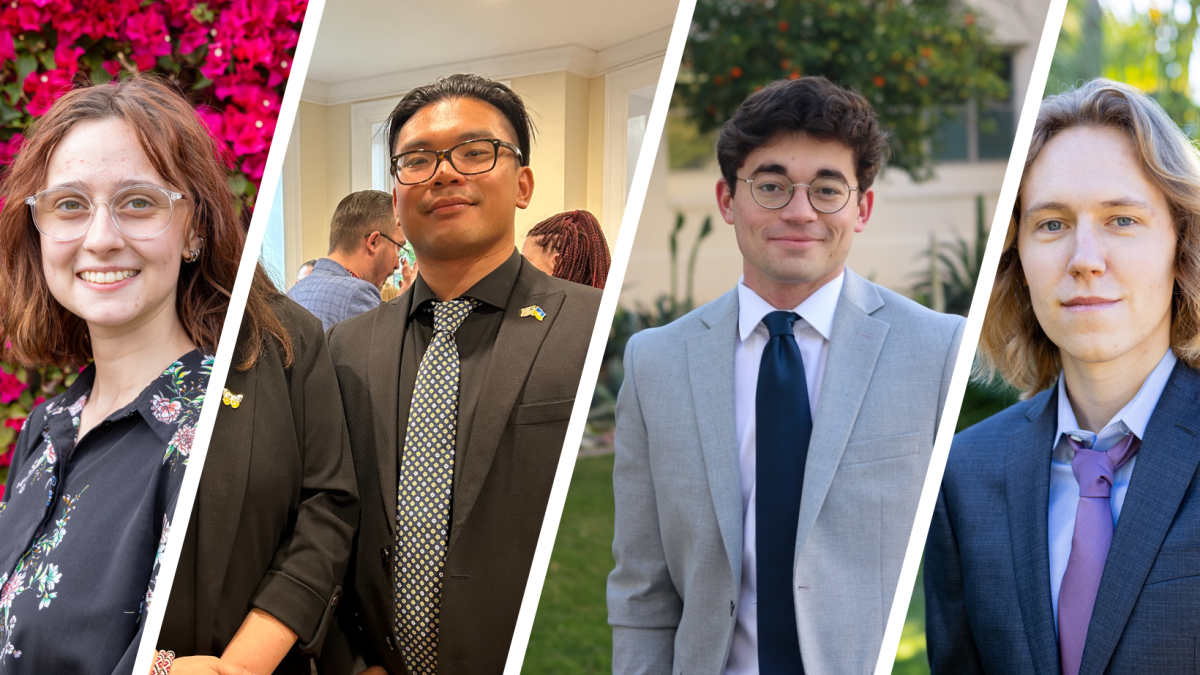How 15 students from ASU's Russian department earned nearly 30 prestigious awards in 1 academic year

Students (from left) Isabelle Kinney, Jarrod Rodriguez, Collin Frank and Thomas Pozsonyi were among the 15 award winners.
This academic year, 15 students from Arizona State University's School of International Letters and Cultures Russian department have received nearly 30 awards, ranging from ASU research scholarships to Department of State internships and Pickering Fellowships.
"These achievements demonstrate that our students possess not only linguistic skills but also cultural knowledge that can be applied in various fields," explained Hilde Hoogenboom, associate professor of Russian. "We're proud to see them being recognized on both national and university levels."
Hoogenboom believes that, in addition to students' own hard work and ambitious nature, it is the dedicated faculty who have helped their students achieve such success. Faculty in the Russian department not only encourage their students to apply for competitive scholarships, they provide crucial support to them throughout the application process, including encouragement and guidance to put the necessary time into writing good grant proposals and essays.
Last year, Hoogenboom worked with student Kristina McCarthy on writing an essay about growing up as a Mexican American.
“She hadn’t realized that this mattered to Fulbright selection committees, who want candidates that represent American diversity," Hoogenboom said. With this essay, McCarthy won a Fulbright Scholarship to Kazakhstan.
When students do not win, faculty encourage them to reapply. Cassidy Durland was waitlisted last year for the Department of State’s Critical Languages Scholarship, but applied again and was selected this year thanks to Senior Lecturer of Russian Saule Moldabekova Robb’s encouragement.
“I’d encourage everyone to get to know their professors and share your goals with them. Your professors want to help you — let them,” said Collin Frank, who received a Thomas R. Pickering Fellowship, a highly competitive award offered to only 45 exceptional students across the U.S. Frank attributes his success to hard work, planning ahead and the guidance of several supportive professors.
“I wouldn’t be where I am today without the patience and guidance of several amazing professors at ASU," Frank said.
Russian language student Jarrod Rodriguez, who served three years of active duty as member of the Army Reserve, recently completed an internship with the U.S. Department of State. He was inspired to apply after transporting humanitarian aid supplies in Ukraine — an opportunity made possible by Hoogenboom and her network of alumni. The experience prompted him to find a path in which his Russian degree would be crucial, and he kept coming back to the idea of interning at the State Department.
The faculty in the Russian department, especially Moldabekova Robb, have worked to create a network among their students so that those who have previously been selected for awards, internships, scholarships and other opportunities can provide insight and advice to those who are currently applying. Not only are the students “inspired by the success of their classroom peers,” Hoogenboom said, they are able to get tips from someone who has been through the application process.
When asked why there was such an increase in government attention and awards to students of Russian and Eastern European studies this year, Hoogenboom said: “Russia’s war in Ukraine has dramatically increased the need for Russian speakers for the agencies in Washington, D.C.”
In addition to these Russian language students who have won a multitude of awards, the Melikian Center received new Title VI National Resource Center and Foreign Language and Area Studies funding, totaling $2.4 million. Hoogenboom hopes to build on these students' successes by applying for a Defense Department Russian Language Flagship grant for $1.2 million to support opportunities for our students to improve their Russian through additional tutoring and scholarships.
Russian students and their awards:
Charlotte Benchoff: Foreign Language and Area Studies Award, summer 2023.
Chandler Camarena: Foreign Language and Area Studies Award, spring 2023, summer 2023, academic year 2023–24; Critical Language Scholarship.
Cassidy Durland: FLAS Award, spring 2023 and summer 2023; Department of State Critical Languages Scholarship.
Collin Frank: Colin Powell Leadership Fellowship; Thomas R. Pickering Foreign Affairs Graduate Fellowship; Fulbright English Teaching Assistantship; U.S. Department of State student internship; Title VIII funding from ASU’s Critical Language Institute.
Isaiah Jacobs: FLAS Award, summer 2023.
Anthony Kerker: FLAS Award, summer 2023.
Isabelle Kinney: Dean’s Medalist; U.S. Department of State student internship.
Braedon Lincoln: FBI summer internship.
Jeremy Parker: FLAS Award, summer 2023.
Thomas Pozsonyi: Dean’s Medalist.
Jarrod Rodriguez: U.S. Department of State student internship.
Christian Shousha: National Post-Secondary Russian Education contest; Fulbright ETA; Title VII funding.
Jessica Sims: Boren/NSEP grant to study Russian; Title VIII funding; U.S. Department of State student internship.
Eric Wagner: National Post-Secondary Russian Essay Contest; Post-Secondary Russian Scholar Laureate.
Katya Wolf: National Post-Secondary Russian Essay Contest.
More University news

ASU graduates overjoyed — and employed
Adam Wiechman will soon be headed to the Big Apple. Grace Reiter will be pulling up roots in May and moving to Ann Arbor,…

ASU community exceeds goal, raises $835K for Valley of the Sun United Way
The Arizona State University community stepped up and raised over $835,266 for the Valley of the Sun United Way — exceeding the $…

ASU launches online ocean futures undergraduate degrees
Our oceans make up three quarters of the planet’s surface and contain most of its biodiversity. Due to rapid and global changes,…

